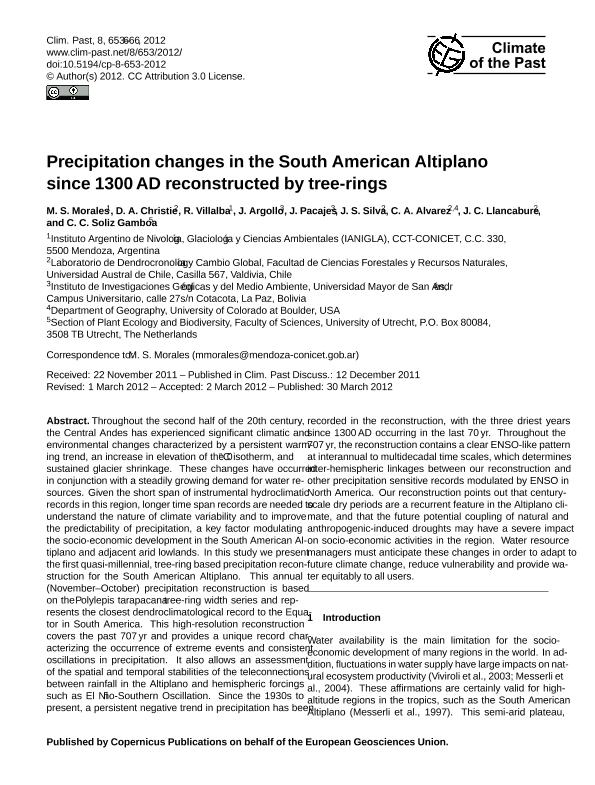Mostrar el registro sencillo del ítem
dc.contributor.author
Morales, Mariano Santos

dc.contributor.author
Christie, D. A.
dc.contributor.author
Villalba, Ricardo

dc.contributor.author
Argollo, J.
dc.contributor.author
Pacajes, J.
dc.contributor.author
Silva, J. S.
dc.contributor.author
Alvarez, C. A.
dc.contributor.author
Llancabure, J. C.
dc.contributor.author
Soliz Gamboa, C. C.
dc.date.available
2019-03-29T17:15:14Z
dc.date.issued
2012-08
dc.identifier.citation
Morales, Mariano Santos; Christie, D. A.; Villalba, Ricardo; Argollo, J.; Pacajes, J.; et al.; Precipitation changes in the South American Altiplano since 1300 AD reconstructed by tree-rings; Copernicus Publications; Climate Of The Past; 8; 2; 8-2012; 653-666
dc.identifier.issn
1814-9324
dc.identifier.uri
http://hdl.handle.net/11336/72837
dc.description.abstract
Throughout the second half of the 20th century, the Central Andes has experienced significant climatic and environmental changes characterized by a persistent warming trend, an increase in elevation of the 0 °C isotherm, and sustained glacier shrinkage. These changes have occurred in conjunction with a steadily growing demand for water resources. Given the short span of instrumental hydroclimatic records in this region, longer time span records are needed to understand the nature of climate variability and to improve the predictability of precipitation, a key factor modulating the socio-economic development in the South American Altiplano and adjacent arid lowlands. In this study we present the first quasi-millennial, tree-ring based precipitation reconstruction for the South American Altiplano. This annual (November-October) precipitation reconstruction is based on the Polylepis tarapacana tree-ring width series and represents the closest dendroclimatological record to the Equator in South America. This high-resolution reconstruction covers the past 707 yr and provides a unique record characterizing the occurrence of extreme events and consistent oscillations in precipitation. It also allows an assessment of the spatial and temporal stabilities of the teleconnections between rainfall in the Altiplano and hemispheric forcings such as El Niño-Southern Oscillation. Since the 1930s to present, a persistent negative trend in precipitation has been recorded in the reconstruction, with the three driest years since 1300 AD occurring in the last 70 yr. Throughout the 707 yr, the reconstruction contains a clear ENSO-like pattern at interannual to multidecadal time scales, which determines inter-hemispheric linkages between our reconstruction and other precipitation sensitive records modulated by ENSO in North America. Our reconstruction points out that century-scale dry periods are a recurrent feature in the Altiplano climate, and that the future potential coupling of natural and anthropogenic-induced droughts may have a severe impact on socio-economic activities in the region. Water resource managers must anticipate these changes in order to adapt to future climate change, reduce vulnerability and provide water equitably to all users.
dc.format
application/pdf
dc.language.iso
eng
dc.publisher
Copernicus Publications

dc.rights
info:eu-repo/semantics/openAccess
dc.rights.uri
https://creativecommons.org/licenses/by-nc-sa/2.5/ar/
dc.subject
Precipitation Reconstruction
dc.subject
Bolivian Altiplano
dc.subject
Tree Rings
dc.subject
Drougths
dc.subject.classification
Meteorología y Ciencias Atmosféricas

dc.subject.classification
Ciencias de la Tierra y relacionadas con el Medio Ambiente

dc.subject.classification
CIENCIAS NATURALES Y EXACTAS

dc.title
Precipitation changes in the South American Altiplano since 1300 AD reconstructed by tree-rings
dc.type
info:eu-repo/semantics/article
dc.type
info:ar-repo/semantics/artículo
dc.type
info:eu-repo/semantics/publishedVersion
dc.date.updated
2019-02-06T17:38:45Z
dc.identifier.eissn
1814-9332
dc.journal.volume
8
dc.journal.number
2
dc.journal.pagination
653-666
dc.journal.pais
Alemania

dc.journal.ciudad
Gottingen
dc.description.fil
Fil: Morales, Mariano Santos. Consejo Nacional de Investigaciones Científicas y Técnicas. Centro Científico Tecnológico Conicet - Mendoza. Instituto Argentino de Nivología, Glaciología y Ciencias Ambientales. Provincia de Mendoza. Instituto Argentino de Nivología, Glaciología y Ciencias Ambientales. Universidad Nacional de Cuyo. Instituto Argentino de Nivología, Glaciología y Ciencias Ambientales; Argentina
dc.description.fil
Fil: Christie, D. A.. Universidad Austral de Chile; Chile
dc.description.fil
Fil: Villalba, Ricardo. Consejo Nacional de Investigaciones Científicas y Técnicas. Centro Científico Tecnológico Conicet - Mendoza. Instituto Argentino de Nivología, Glaciología y Ciencias Ambientales. Provincia de Mendoza. Instituto Argentino de Nivología, Glaciología y Ciencias Ambientales. Universidad Nacional de Cuyo. Instituto Argentino de Nivología, Glaciología y Ciencias Ambientales; Argentina
dc.description.fil
Fil: Argollo, J.. Universidad Mayor de San Andrés; Bolivia
dc.description.fil
Fil: Pacajes, J.. Universidad Mayor de San Andrés; Bolivia
dc.description.fil
Fil: Silva, J. S.. Universidad Austral de Chile; Chile
dc.description.fil
Fil: Alvarez, C. A.. Universidad Austral de Chile; Chile. University of Colorado; Estados Unidos
dc.description.fil
Fil: Llancabure, J. C.. Universidad Austral de Chile; Chile
dc.description.fil
Fil: Soliz Gamboa, C. C.. University of Utrecht; Países Bajos
dc.journal.title
Climate Of The Past

dc.relation.alternativeid
info:eu-repo/semantics/altIdentifier/url/http://www.clim-past.net/8/653/2012/
dc.relation.alternativeid
info:eu-repo/semantics/altIdentifier/doi/https://doi.org/10.5194/cp-8-653-2012
Archivos asociados
